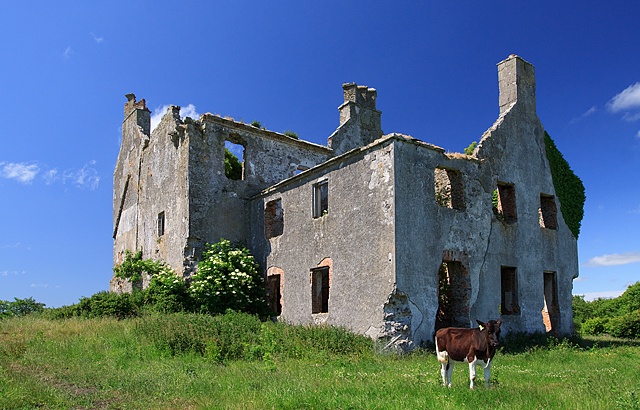Greenwoodpark
Houses within 5km of this house
Displaying 12 houses.
Houses within 5km of Greenwoodpark
Displaying 12 houses.
| House name | Description | |
|---|---|---|
| Glenmore | At the time of the first Ordnance Survey Glenmore was occupied by the Rev St George Knox, curate of Crossmolina, as the Ormes were living in Dublin. Glenmore became the property of Godfrey Fetherstonhaugh after the 1853 sale. His mother was an Orme of Abbeytown. Well maintained and owned by a French family who advertised the sale of the house in September 2006. |

|
| Ballintober | At the time of Griffith's Valuation, this property was held in fee by Nicholas Handy and valued at £8. The house is no longer extant but it was positioned behind the present house, where the red corrugated roofed building now stands. |

|
| Fortland | The Jacksons held this property from the Pratts of Enniscoe. It was described in the 1830s as a plain house ornamented with a few trees and scrubs. At the time of Griffith's Valuation it was leased by George H. Jackson from Mervyn Pratt when it was valued at £12. It is still extant ad now owned by Billy Cook. |

|
| Rappa Castle | An old Bourke castle, granted to a Cromwellian soldier named Crofton. It passed into Knox ownership through marriage and was the seat of this influential branch of the Knox family throughout the 18th and 19th centuries. In 1786 Wilson refers to it as "the pleasant seat of Mr. Knox". At the time of Griffith's Valuation it was held in fee by Annesley Knox and valued at £30. Slater notes it as the seat of Captain Annesley Knox in 1894. Occupied by the Knox family until the early 20th century, the house is now a ruin. |

|
| Netley House | The home of Henry William Knox, fourth son of Francis Knox of Rappa, occupied by Richard Burke at the time of Griffith's Valuation when the house was valued at £30.. The house is now a ruin. |

|
| Knockglass House/Woodville | Also known as Knockglass House, this residence was situated close to the demesne of Greenwoodpark. At the time of Griffith's Valuation it was leased by John McDonnell from Major Knox when it was valued at £6. It is labelled Knockglass House on the 1st edition Ordnance Survey map but appears to be in ruins by the publication of the 25-inch edition map in the 1890s. | |
| Owenmore or Millbrook | Ordnance Survey Field Name Books record a 'neat cottage' in the townland of Correens, built in 1796 and called Millbrook. Irish Tourist Association File records Owenmore as the residence of the Misses Knox in 1942, erected about 1830 by the Orme family. The house belonged to the McCausland family in the latter part of the 20th century. Now owned by Gerry O'Mara. |

|
| Belville | An Orme home in the first half of the 19th century. Described in 1942 by the Irish Tourist Association surveyor as a large house near the church at Ballyglass, formerly owned by the Orme family and "purchased some years ago by Mr MacDonald, Kilfian. It has remained unoccupied...", due to a popular belief among the local people that the house was haunted. It is no longer extant. | |
| Abbeytown | The original historical abbey buildings in this townland are described as 'in ruins' at the time of the first Ordnance Survey. It was formerly the residence of a Mr Crofton but was then occupied by a caretaker for the Orme family. Abbeytown House is shown a litte to the north on the later 25-inch map of the 1890s. The property was bought by Anthony Carolan of Crossmolina at the sale in 1852 and the house was later lived in by the parish priest. Abbeytown is still extant and occupied. |

|
| Knockglass | The main residence of the Paget family in the 19th century. Afterwards it passed into the possession of Patrick Rowe and later served as the home of the Church of Ireland Bishop of Tuam, Achonry and Killala. In 2011 it was offered for sale. |

|
| Fahy | Built 1796, a former Paget home occupied by Ernest Knox of the Castlereagh family in the late 1830s. Lackland Chisholm was the tenant at Fahy in 1853. The original house is no longer extant. | |
| Ballybroony | An 18th century house, occupied by Fallon in the late 1770s and in 1786. The residence of the Perkins family from the early 19th century. It was held by Arthur Perkins from the Earl of Arran at the time of Griffith's Valuation when it was valued at £17. Lived in until the early 21st century and for sale in 2006. Restoration work was underway in 2010. |

|

